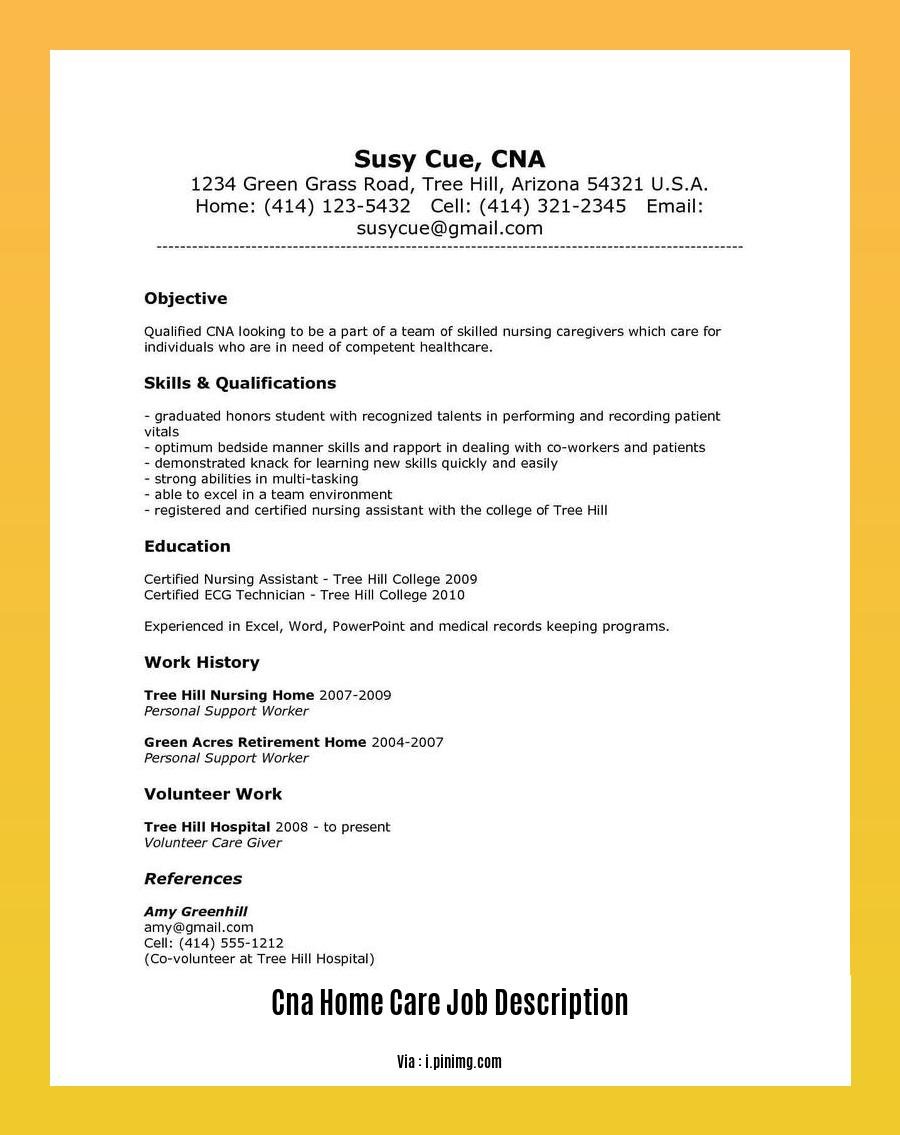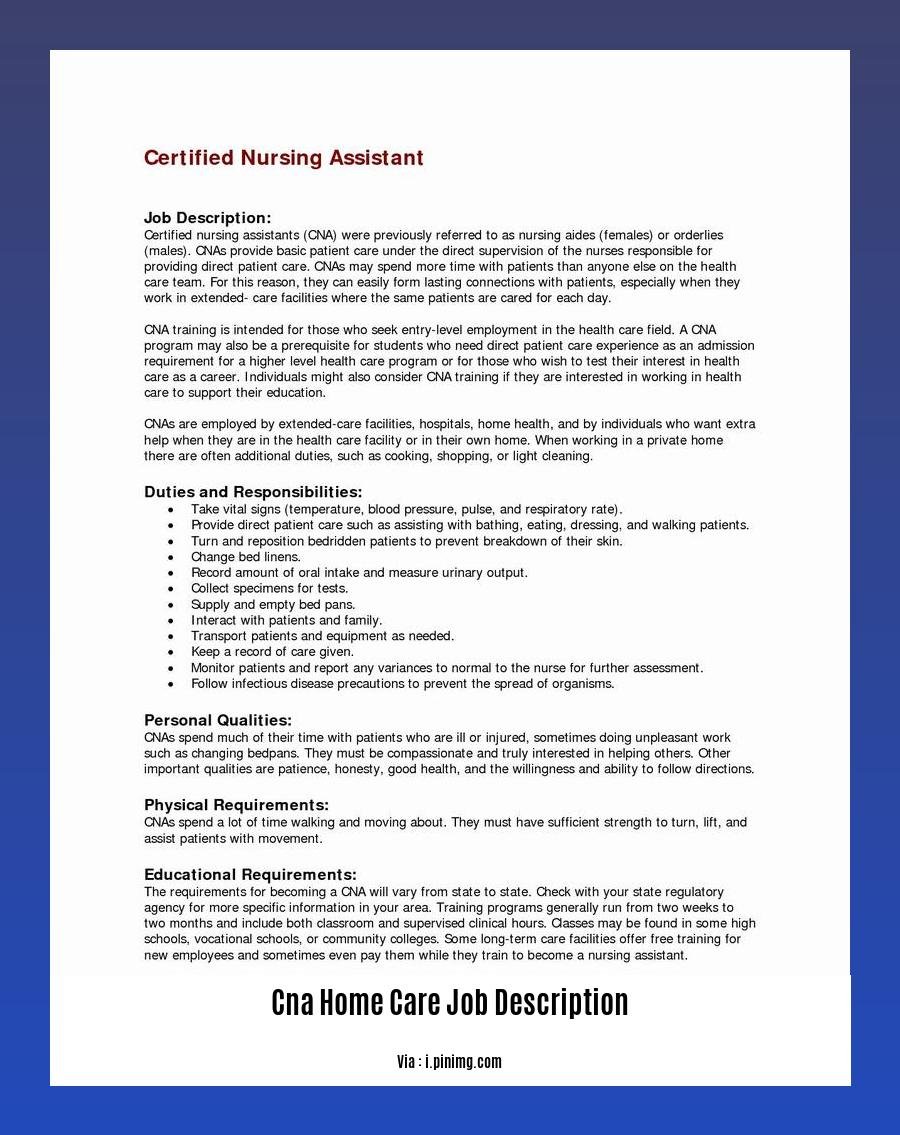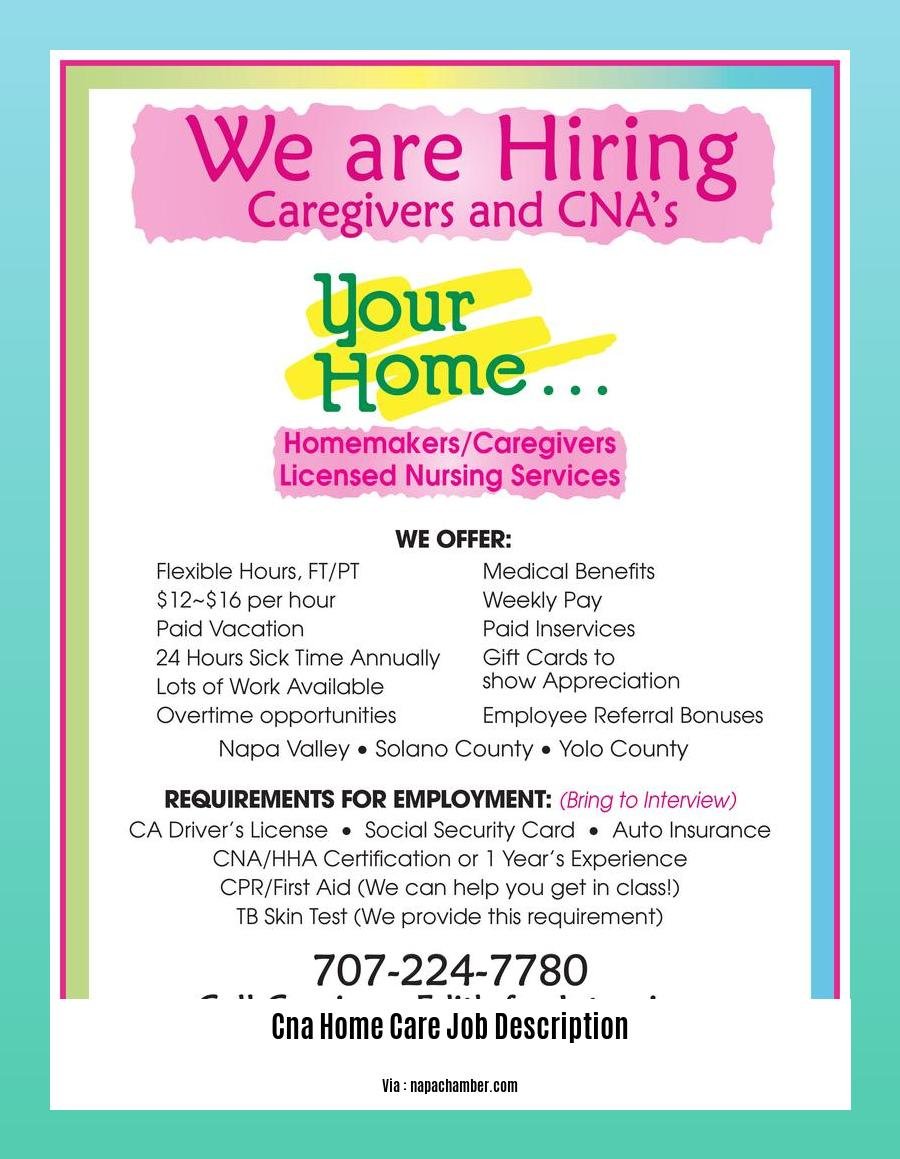Discover the multifaceted role of a Certified Nursing Assistant (CNA) in the realm of home care with our comprehensive job description: [CNA Home Care Job Description: Providing Compassionate Care and Support]. Delve into the intricacies of this rewarding career, encompassing the provision of personalized attention and assistance with activities of daily living, medication management, wound care, and monitoring vital signs. Uncover the qualities that define an exceptional CNA, including strong communication and interpersonal skills, a commitment to staying up-to-date with healthcare practices, and an unwavering dedication to delivering the best possible outcomes for clients in their own homes. Explore the essential role CNAs play in enhancing the well-being and independence of individuals receiving care in their familiar surroundings.
Key Takeaways:
- CNA home care provides basic health care services and support for patients’ well-being
- CNAs assist with personal hygiene, dressing, bathing, and other daily tasks
- They perform basic health care services like checking vital signs and giving medications
- CNAs help with light housekeeping and transportation arrangements
- They offer physical support for daily activities like bathing and mobility
- CNAs take notes on patients’ health conditions to help healthcare providers make informed decisions
CNA Home Care Job Description

As a CNA home care, you are an integral player in providing compassionate care and support to individuals in the comfort of their own homes. Your responsibilities revolve around ensuring the well-being of your clients, helping them maintain their independence, and promoting a safe and supportive environment.
Key Duties and Responsibilities:
- Personal Care: Assist clients with daily tasks like bathing, dressing, grooming, and personal hygiene. Maintain a clean and comfortable living space for the client.
- Health Monitoring: Monitor vital signs, such as blood pressure, pulse, and temperature, and report any deviations to healthcare professionals. Administer medications as directed by a doctor or nurse.
- Home Management: Engage in light housekeeping, including laundry, meal preparation, and errands, to ensure a safe and comfortable living environment. Accompany clients to medical appointments and assist with transportation arrangements.
- Communication and Record-Keeping: Communicate effectively with clients, their families, and healthcare providers to coordinate care and address concerns. Document client health status, observations, and care provided in patient records.
Qualifications and Skills Required:
- Certification: Possess a valid CNA certification or equivalent qualification.
- Experience: Have prior experience working as a CNA in a home care setting or a related field.
- Skills: Demonstrate strong interpersonal and communication skills. Be patient, compassionate, and respectful in dealing with clients and their families. Maintain a positive attitude and a commitment to providing quality care.
Benefits of Working as a CNA Home Care:
- Rewarding Career: Experience the fulfillment of making a positive impact on the lives of others.
- Flexible Work Schedule: Enjoy a flexible work schedule that allows for a healthy work-life balance.
- Growth Opportunities: Pursue opportunities for professional development and advancement within the healthcare field.
How to Write a Strong CNA Home Care Job Description:
- Start with a Compelling Introduction: Introduce the position and its significance in providing quality care to clients in their homes.
- Outline Key Responsibilities: Clearly define the duties and responsibilities of a CNA home care. Include tasks related to personal care, health monitoring, home management, and communication.
- Specify Qualifications and Skills: List the necessary qualifications, such as CNA certification and experience, as well as the essential skills required for the role.
- Highlight Benefits and Perks: Include information about the benefits and perks offered by your organization to attract qualified candidates.
- Promote Your Organization’s Culture: Share details about your organization’s values, mission, and commitment to providing exceptional care.
By following these steps, you can create an effective CNA home care job description that attracts qualified candidates who are passionate about providing compassionate care and support to individuals in need.
-
Searching for a nearby emergency vet? Find the closest 24-hour emergency vet in your area. closest 24 hour emergency vet
-
Searching for details and duties related to the position? Discover the comprehensive cna job description for home health. cna job description for home health
-
Want to explore co-op classes for homeschoolers? Discover the advantages and options available for co-op classes for homeschoolers. co-op classes for homeschoolers
-
Curious about the differences between coloring hair at home and at a salon? Explore the pros and cons of coloring hair at home vs salon. coloring hair at home vs salon
Key components of a CNA home care job description

Becoming a Certified Nursing Assistant (CNA) in the home care setting is an incredibly rewarding career. It allows you to provide compassionate care, support, and assistance to people in the comfort of their own homes. If you’re planning to hire a CNA for home care services, here’s a closer look at the key components of a CNA home care job description.
Duties and Responsibilities:
-
Compassionate Care: CNAs are responsible for offering compassionate care to clients in need. This includes assistance with activities of daily living, such as bathing, dressing, grooming, and personal hygiene.
-
Home Management: CNAs ensure clients live in a clean and comfortable environment. They handle light housekeeping, laundry, meal preparation, and running errands to maintain a sanitary and organized living space.
-
Vital Sign Monitoring: CNAs play a crucial role in monitoring clients’ vital signs, which includes temperature, pulse, respiration, and blood pressure. They report any deviations to healthcare professionals to ensure prompt medical attention when necessary.
-
Medication Administration: CNAs can administer medications as directed by doctors or nurses. They ensure accurate and timely medication administration to promote client recovery and well-being.
-
Communication and Collaboration: CNAs have excellent communication skills to effectively engage with clients, families, and healthcare providers. They record client health status, observations, and care provided to ensure continuity of care.
Qualifications and Skills:
-
Certifications & Training: CNAs must possess a valid CNA certification or equivalent. They typically undergo a state-approved education and training program that includes classroom instruction and clinical experience.
-
Interpersonal and Communication Skills: CNAs are patient, compassionate, and respectful in their interactions with clients. They have strong interpersonal skills, are excellent listeners, and can effectively communicate with diverse populations.
-
Positive Attitude: CNAs bring a cheerful, positive attitude to their work. They understand that positivity and emotional support play a vital role in client recovery and well-being.
Benefits of Working as a CNA in Home Care:
-
Autonomy and Flexibility: CNAs enjoy a level of autonomy in their roles, with the flexibility to work independently and manage their time effectively. The home care setting allows CNAs to establish personal connections with clients and make a meaningful impact on their lives.
-
Professional Development: CNAs have access to opportunities for professional development, allowing them to enhance their skills and knowledge. They can pursue continuing education courses, attend workshops, and participate in training programs to stay updated with the latest best practices.
-
Rewarding Career: CNA home care is a gratifying career that allows individuals to make a positive difference in the lives of those they serve. The chance to see clients progress and improve their quality of life is incredibly rewarding and fulfilling.
Key Takeaways:
- CNAs play a crucial role in providing compassionate care and support to individuals in the comfort of their own homes.
- They assist with activities of daily living, monitor vital signs, administer medications, and maintain a clean living environment.
- The job requires a valid CNA certification, interpersonal and communication skills, and a positive attitude.
- CNA home care offers autonomy, flexibility, professional development, and the opportunity to make a meaningful impact on clients’ lives.
Relevant URL Sources:
- What is a CNA and What Do They Do?
- CNA Job Description and Essential Responsibilities
How to Write a CNA Home Care Job Description
Crafting an effective CNA home care job description is crucial for attracting qualified candidates who align with your organization’s values and can deliver exceptional care. Here’s a step-by-step guide to help you create a compelling job description:
- Start with a Strong Introduction:
-
Introduce the position by highlighting the significance of CNA home care services in supporting individuals’ well-being and independence.
-
Define Key Responsibilities:
-
Outline the primary duties of a CNA home care provider, including personal care assistance, medication management, vital signs monitoring, and light housekeeping.
-
Specify Qualifications and Skills:
- Clearly state the required qualifications, such as CNA certification, prior experience, and relevant training.
-
Emphasize essential skills like empathy, communication, and attention to detail.
-
Highlight Benefits and Perks:
-
Showcase the advantages of working for your organization, such as competitive compensation, flexible scheduling, and opportunities for professional development.
-
Promote the Organization’s Values:
-
Include a section that conveys your organization’s mission, values, and commitment to providing exceptional care.
-
Use Clear and Concise Language:
-
Use straightforward language that is easy to understand and avoids jargon.
-
Proofread and Edit:
- Before posting the job description, proofread it carefully to ensure there are no errors in grammar or spelling.
Key Takeaways:
-
A well-crafted CNA home care job description attracts qualified candidates who align with your organization’s values and can deliver exceptional care.
-
Clearly define the key responsibilities, qualifications, and skills required for the position.
-
Highlight the benefits and perks offered by your organization to attract top talent.
-
Promote your organization’s mission, values, and commitment to providing exceptional care.
-
Use clear and concise language that is easy to understand.
Relevant URL Sources:
- How to Write a CNA Job Description
- Job Description for a CNA (Certified Nursing Assistant)
Tips for writing a CNA home care job description
It’s time to dive into the art of outlining an enticing CNA home care job description, one that captivates attention and attracts the crème de la crème of compassionate caregivers. Creating a description that is both informative and engaging requires a touch of strategic thinking and a dash of empathy. Grab your notepad and pen, because here’s a pro guide to crafting a stellar posting:
Assess the Needs
Begin by understanding the unique needs of your home care agency. What kind of services do you offer? Do you cater to specific clientele with specialized requirements like dementia care or post-surgical recovery assistance? Tailor your description to reflect these vital details.
Capture the Essence of a CNA
Paint a vivid picture of the ideal CNA – someone who embodies compassion, patience, and a passion for providing exceptional care. Highlight the qualities that make your agency stand out in delivering personalized and dignified support to clients.
Define Responsibilities with Clarity
Outline the duties and responsibilities of the position clearly and concisely. Use bullet points to list tasks such as personal care assistance, medication management, maintaining client records, and collaborating with healthcare professionals. Make sure these points align with your agency’s goals and the needs of your clients.
Qualifications and Skills – The Perfect Match
Spell out the qualifications you seek in potential candidates. Do you require a state-issued CNA certification? What about a specific level of experience or specific training? Include a list of essential skills, such as effective communication, strong interpersonal abilities, and attention to detail.
Benefits and Compensation – A Rewarding Package
Showcase the benefits and compensation your agency offers to entice top-tier CNAs. Mention competitive pay, opportunities for professional development, flexible scheduling options, and a supportive work environment. Remember, a well-compensated and valued workforce is more likely to deliver exceptional care.
Additional Tips to Seal the Deal
* Use inclusive language and avoid jargon to ensure your description is accessible to all.
* Keep it concise and compelling. Remember, recruiters and potential candidates have short attention spans.
* State the job location and any travel requirements upfront.
* Share your agency’s mission, values, and commitment to excellence. This helps attract candidates who align with your organization’s ethos.
Key Takeaways:
- Understand your agency’s unique needs and tailor the description accordingly.
- Write with empathy and enthusiasm to attract compassionate and dedicated candidates.
- Clearly outline responsibilities and qualifications, using bullet points for clarity.
- Highlight the benefits and compensation package to attract top talent.
- Craft a concise, jargon-free description that reflects your agency’s values and mission.
Relevant URL Sources:
-
Indeed
-
Top Registered Nurse
FAQ
Q1: What are the primary responsibilities of a CNA in home care?
A1: CNAs in home care provide comprehensive support to patients, assisting with personal hygiene, dressing, bathing, medication administration, basic healthcare services, and light housekeeping. They also offer physical support for daily activities, such as bathing and dressing, and monitor vital signs to ensure the patient’s well-being.
Q2: What skills and qualities are essential for CNAs in home care?
A2: CNAs in home care should possess strong interpersonal and communication skills to build trusting relationships with patients and their families. Compassion, patience, and attention to detail are crucial, as is the ability to work independently and as part of a team. Physical strength and stamina are also important, as CNAs may need to assist with lifting and moving patients.
Q3: What is the work environment like for CNAs in home care?
A3: CNAs in home care typically work in private homes, providing one-on-one care to patients. They may work regular daytime hours or shifts that include evenings, weekends, or holidays. The work can be physically and emotionally demanding, requiring CNAs to be adaptable and flexible in their approach to patient care.
Q4: What are the educational and training requirements for CNAs in home care?
A4: To become a CNA in home care, individuals must complete a state-approved training program and pass a national certification exam. The training program typically takes 4-12 weeks and includes classroom instruction and clinical experience. CNAs must also maintain their certification by completing continuing education courses every two years.
Q5: What are the career prospects for CNAs in home care?
A5: CNAs in home care have a growing job outlook, with a projected 15% increase in employment from 2021 to 2031. This growth is driven by the aging population and the increasing demand for home healthcare services. CNAs with strong skills and experience can advance their careers by becoming certified in specialized areas, such as geriatrics or dementia care, or by pursuing leadership positions.
- Best Color Backsplash For White Cabinets: Ideas Youll Love - November 27, 2025
- White On White Backsplash: A Timeless Kitchen Design Choice - November 26, 2025
- Tile Backsplash With White Cabinets: A Kitchen Design Guide - November 25, 2025










